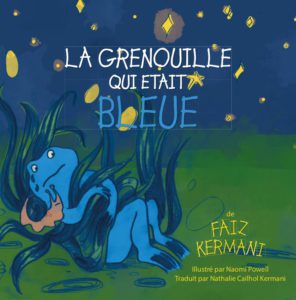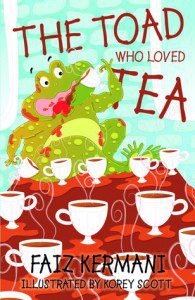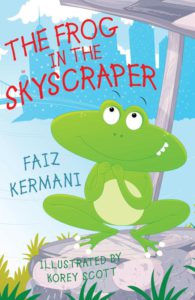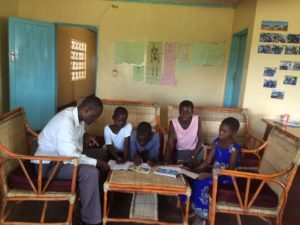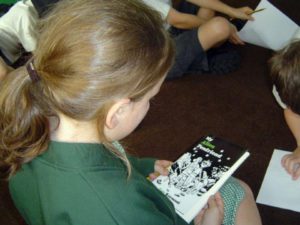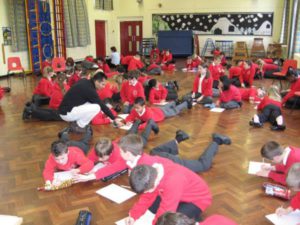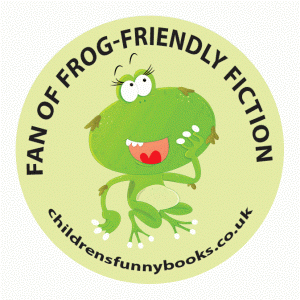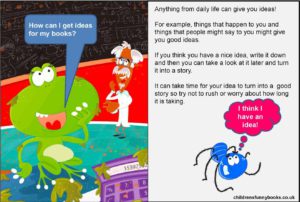These include My Alien Penfriend, Golbo the Spider’s Amazing Vacuum Cleaner Adventure, The Frog Who Loved Mathematics, The Frog in the Skyscraper, The Frog Who Was Blue and The Toad Who Loved Tea.
His books have won awards in the US and UK and have been translated into French, German, Spanish and Russian. He is involved in various literacy projects with schools and is always happy to hear from anyone on ideas for educational collaborations.
Interview for Booksandwords
When and why did you choose to write a children’s book?
I’ve always loved reading children’s books and I’ve always enjoyed writing. I guess it was always an ambition to write a children’s book. I wrote one for fun…and then it just continued!
Why about toads?
I like frogs. I can’t really tell you why, but I genuinely do. Toads are in the same general family as frogs, but people don’t like them so much so I thought I’d try and give them some good publicity. I like to call my stuff frog-friendly fiction!
Where does your inspiration come from? Is it based on people round you? Or do your characters have a little bit of you?
The crazy events in life inspire me, but I can’t always tell people exactly why I write what I do. It’s fun to hear what other people think of the stories and what influenced me to write them.
Illustrations are very important in this book. How did you choose your illustrator?
I like bright, fun colours and as my stories have a lot of crazy, surreal themes I want the illustrations to reflect those aspects. I am really lucky to have worked with illustrators who understand this and can bring the characters to life.
What is very important in your books?
Humour is important to me. I want readers to have a fun time reading the stories. If people say the books are entertaining then that is the most important thing. Anything else is a bonus.
How does your writing process succeed?
Honestly, my approach is terrible! I am random and disorganised with respect to my writing ─ as I do it in my free time. People say you should have a plan when writing, but I rarely do. Sometimes I find myself writing and not knowing where it will lead me. It’s fun to do, but it explains why some of my stories end up being so unusual. I am more organised and critical when it comes to editing my drafts.
Do you have a place of your own to write?
I write anywhere I can. If I get an idea while I’m doing something else I try to note it down – on paper or a phone. Later I revisit it and use the idea in a story.
How do you choose your theme?
That’s so hard to say. Ideas just pop into my head at random moments. My last book (The Toad Who Loved Tea) was about a toad who becomes a tea expert. The idea for it came to me in 30 seconds but I don’t know why – I wasn’t drinking tea at that particular time and I don’t remember seeing any toads either!
You need to do a bit of research. What was the most special thing you had to search?
I have become a lot better at my research. A while back I wrote a story about a spider (Golbo the Spider’s Amazing Vacuum Cleaner Adventure). Although I got my vacuum cleaner details right I clearly didn’t do enough research about spiders. So many people have told me that the illustrations show a spider with six legs but it should be eight! For my frog and toad books I have researched so many details that I can tell you so many things about them now. If I am ever short of conversation I am happy to tell people all about frogs and toads!
Do you write for living or as hobby?
It is only a fun hobby that has evolved over the years. My background is scientific and so my day job is quite serious. Writing children’s books is a fun diversion. I have also written some medical publications ─ but you won’t find any frogs in those!
Is feedback from your readers important to you?
Absolutely. I visit schools a lot and have had lots of positive feedback from younger readers and teachers which has helped me improve my writing. Sometimes I get more negative feedback from adults, but in many cases I don’t think they understand my books. They overanalyse the plots and take some of the ideas far too literally. There’s a time and place for serious scientific research, but it’s not for determining why a talking toad likes tea!
What did you love to read when you were a child?
I love stories with fun and adventurous themes. Roald Dahl was my favourite author and I especially liked James and the Giant Peach. I still read children’s books when I can. The Harry Potter series is another favourite of mine.
What did you want to become when you were little?
An astronaut. I love anything to do with space. My first book (My Alien Penfriend) had a space theme. I’d love to write a frog-inspired space adventure in the future.
How do you combine your job during the day and your writing?
With great difficulty. I use odd moments here and there to write. Early mornings, weekends or holidays are good times. Overall, I have lots of half-finished ideas but never have enough time to write them. Sometimes I get new story ideas during my work day which means I have even more of a backlog for writing.
Are there other books about toads?
Oh yes! I have just finished a rhyming story set in the Middle Ages about a frog knight and a toad villain. We are working on the illustrations now. I have no idea if the concept will work as some people have told me rhyming is not a good idea. I decided to try and experiment with it anyway as it could be fun.
If you had the power to change something in the world, what would it be?
I would make people be kinder to each other.
How do you write?
I usually write on a computer, but occasionally I will do things the old-fashioned way. When I am organised paper is quite good to plan out parts of the plot for a story.
You are involved with some charity projects. Can you tell us about?
I work with various charities in the medical, literacy and environmental fields. One of the main organisations I am involved with is the World Medical Fund (www.worldmedicalfund.org), a small children’s medical charity that works in Malawi in Africa.
They do amazing work in providing healthcare for children living in remote areas and their projects rely entirely on donations. I collaborated with them on a book called The Frog Who Was Blue. It’s been a nice way to raise their profile and children who attend their health clinics can read it (as sometimes they get bored waiting around for tests and health checks). The French translation of the book came out recently and a German one is on the way. I would be very interested in having it in other languages, including Dutch.
I also work with a few schools and charities on literacy and reading projects. I’m always very impressed by how imaginative children are when I visit schools.
On the environmental side I’m a supporter of an organisation called Save The Frogs charity (www.savethefrogs.com). They have been a great source of information for all my frog and toad research.
Why are they so important to you?
I’ve worked with voluntary organisations for many years so it is nice to be able to use my writing to help worthy causes. I’ve met a lot of great people through these collaborations too.
Which tip could you give to someone who wants to write?
Go for it and don’t let people spoil your ambition! Sadly, you will have lots of people telling you not to write and giving you negative comments about your work. It’s so easy to find critics, but if you feel you have a story to write you should just try it out. Eventually, you will find readers out there who appreciate it. If I had one tip it would be to ensure you finish your story. You can always go back and edit it. Even if it is not perfect you will understand so much more about the writing process by completing the project. Also the more you write, the more you will improve as you will gain confidence and can incorporate feedback from readers.
Dear Faiz, I’m very glad that I met you through your lovely books. The stories are very funny and the illustrations are very bright. I’m sure that the children like your books a lot. I’m also impressed by the good work you’re doing for the people in Africa and elsewhere. You’re a good person. I hope that your books will be translated in Dutch, so I can read and make a review for our children here. It would be really nice. I will follow your writers career.


